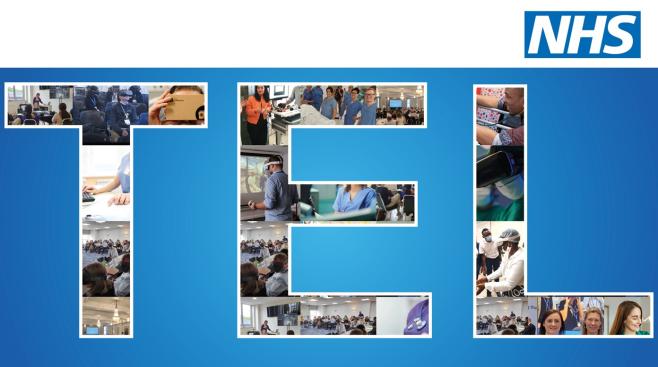You are here
Case Study: Technology Enhanced Learning
Education and training are evolving to meet the changing needs of the current and future workforce and developments in technology. TEL is bringing key services into the NHS workforce, delivering access to new technologies, specialist content and resources and flexible ways of working, and providing the support and strength to grow by tackling some of the systemic challenges faced by organisations and individuals.
Dr Neil Ralph, Head of Technology Enhanced Learning
Summary
TEL has grown to meet the changing needs of the health and care workforce. We provide access to simulation and learning technologies, platforms hosting specialist elearning content and resources, and support which are essential to delivery of the NHS workforce training and delivery ambitions.
Our services are equitable, efficient and sustainable and are changing how the health and care workforce learns, saving time and money compared to traditional classroom-based learning. We support the successful adoption of educational technologies and simulation and collaborate with partners in health and care nationally, regionally and locally.
Our services
- Learning platforms free to access and available 24/7, for specialist training and resources.
- Over 500 elearning programmes for all health and care roles with content developed with partners and clinical experts.
- Access at scale to XR technology, gathering research and evidence, and building a network of best practice.
- Virtual and Hybrid Learning faculty and Community of Practice supporting educators and technicians and the strategic needs of ICS and local organisations.
- TEL Readiness and Maturity (TRaM) Assessment to overcome barriers of adoption, identify gaps and organisational needs.
- TEL supports PGDME, education commissioning and reform, blended learning and national NHS programmes.
Impact
In March 2013 we had 11,630 active users and 138,275 session launches on our elfh platform. In 2023, we have 2.5m users and recently celebrated 100,000,000 session launches.
Work is in progress for the Learning Hub to include elfh and DLS content and become one of the biggest learning platforms in the world. Currently we have 16,492 resources in 213 catalogues and 693 contributors.
Learning content is available to the entire health and care workforce, including teachers, volunteers and local government and links with 471 local training platforms, the Electronic Staff Record (ESR) and OpenAthens.
Elearning supports all NHS roles, specialist care, national programmes, public health delivery and national emergencies. Here are a few examples:
- 2007 – Anaesthesia launches as one of our many collaborations with Royal Colleges and now has 65,326 users and 5.5m session launches.
- 2015 – Flu Vaccinations supports the annual public health campaign and has more than 110,000 users and 1.2m launches
- 2017 - Care Certificate identifies standards that health and care professionals adhere to in their daily and has 148,886 users and more than 4m launches
- 2020 – Covid Vaccinations has 233,294 users and 3 million launches in 3 years. It was provided internationally for free showing the rapid collaborative response to the pandemic.
TEL Global has expanded its role as an expert advisor and trusted partner to support the education and training of millions of health and care workers globally.
XR Hubs is running 13 evidence gathering pilots from a library of XR devices available to NHS organisations in both primary and secondary care enabling equal access to technology.
TEL is setting out a national strategic vision for XR and simulation, developing a Simulation Faculty and providing support for technicians to encourage collaboration and innovation.
TEL Readiness and Maturity (TRaM) Assessment has been completed by 120 NHS organisations.
The Virtual and Hybrid Learning faculty (VHLF) has delivered 191 Masterclass sessions to 5,000 delegates and built a Community of Practice with more than 1700 members since launching in October 2021.
Our research and academic workstream is ensuring that the techniques and technologies we use are evidence-informed and impactful, and contribute new knowledge in healthcare education delivery and workforce development.
Future direction
We will continue our important work to support the NHS and drive forward innovation, collaboration and access to educational technologies that can improve education and training and positively impact patient care. Our next focus is the delivery of the Long-Term Workforce Plan which is due for publication this spring and we look forward to continued working with our partners across the health, care, education and technology sectors.
